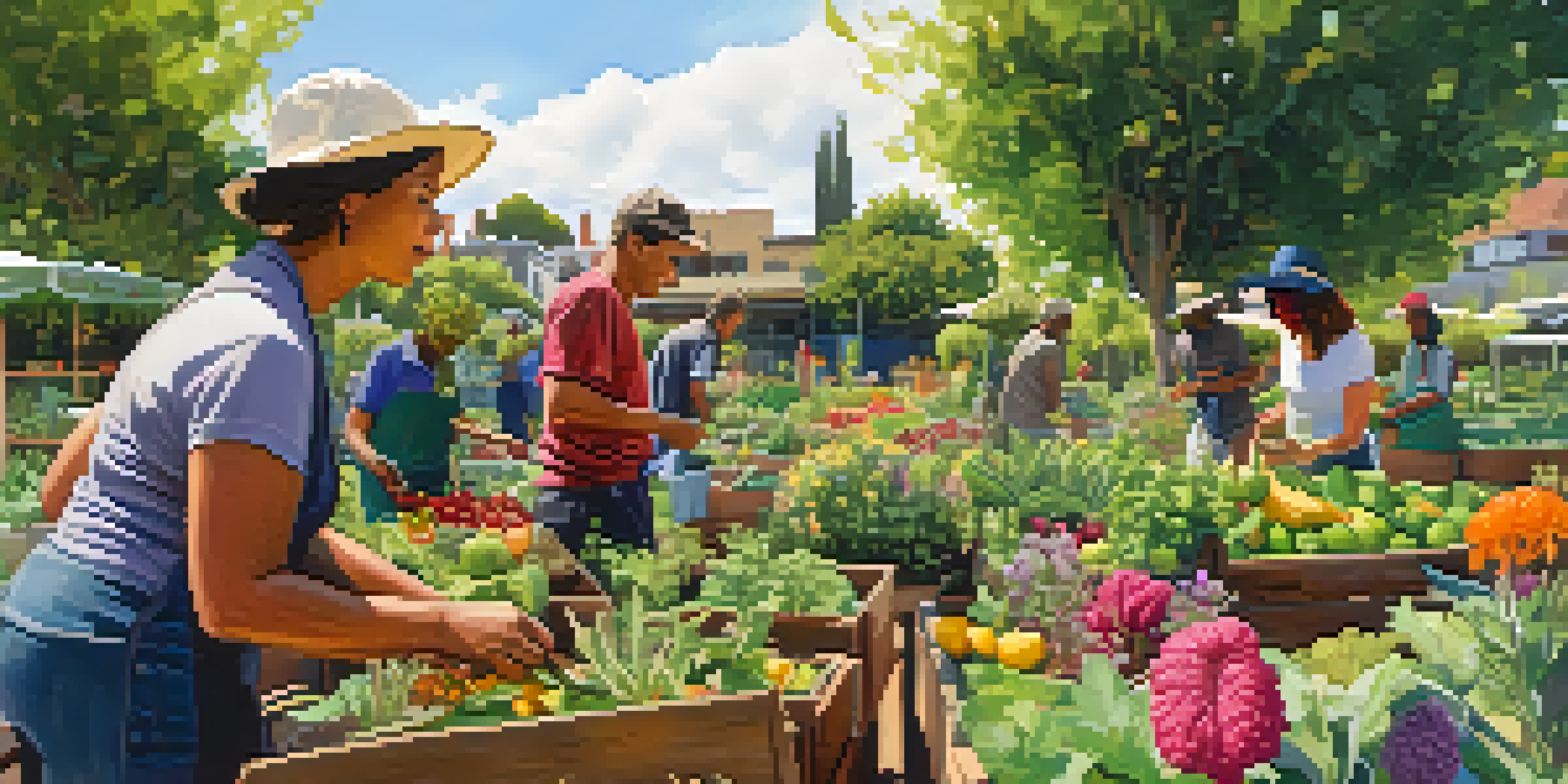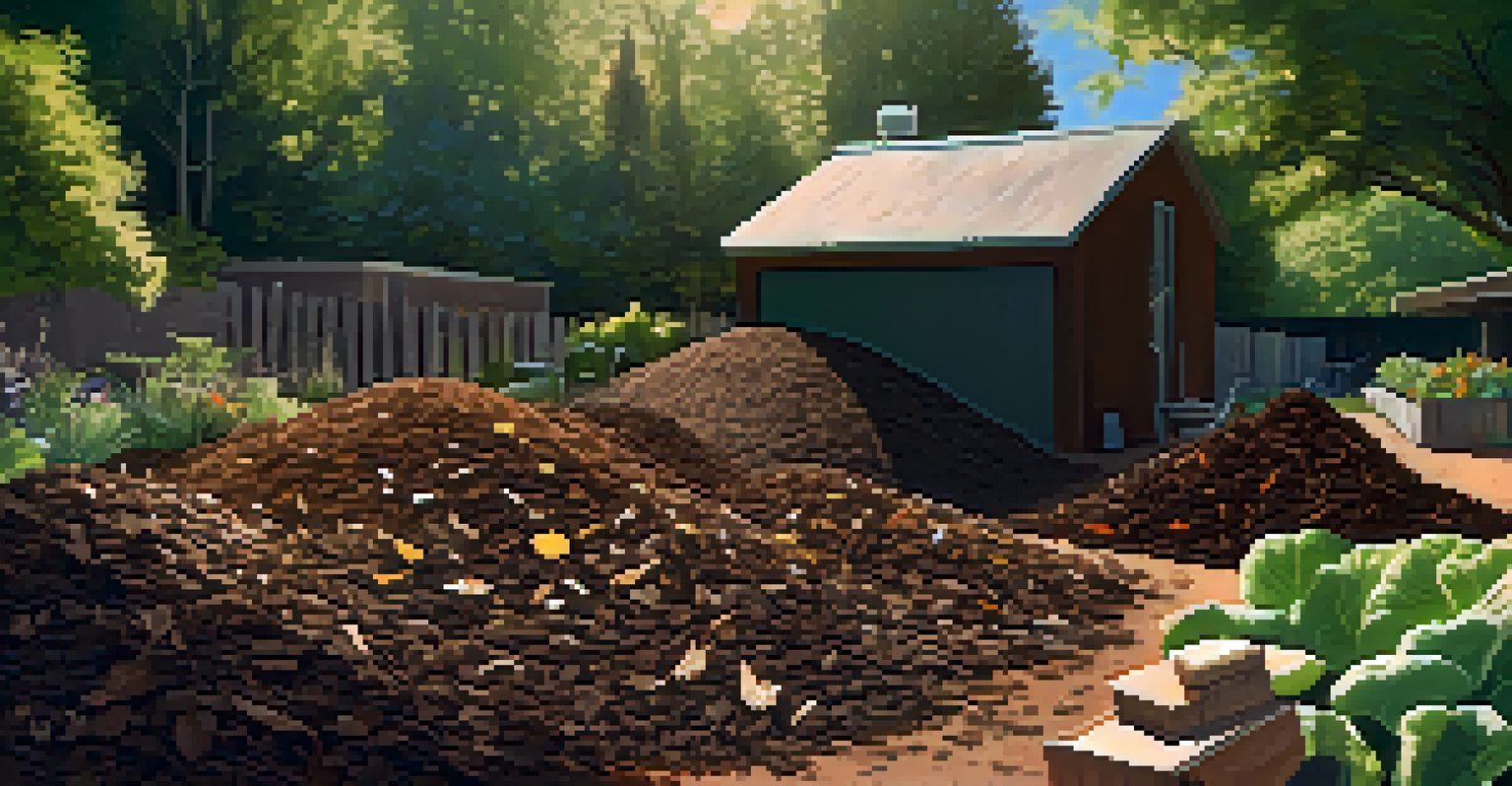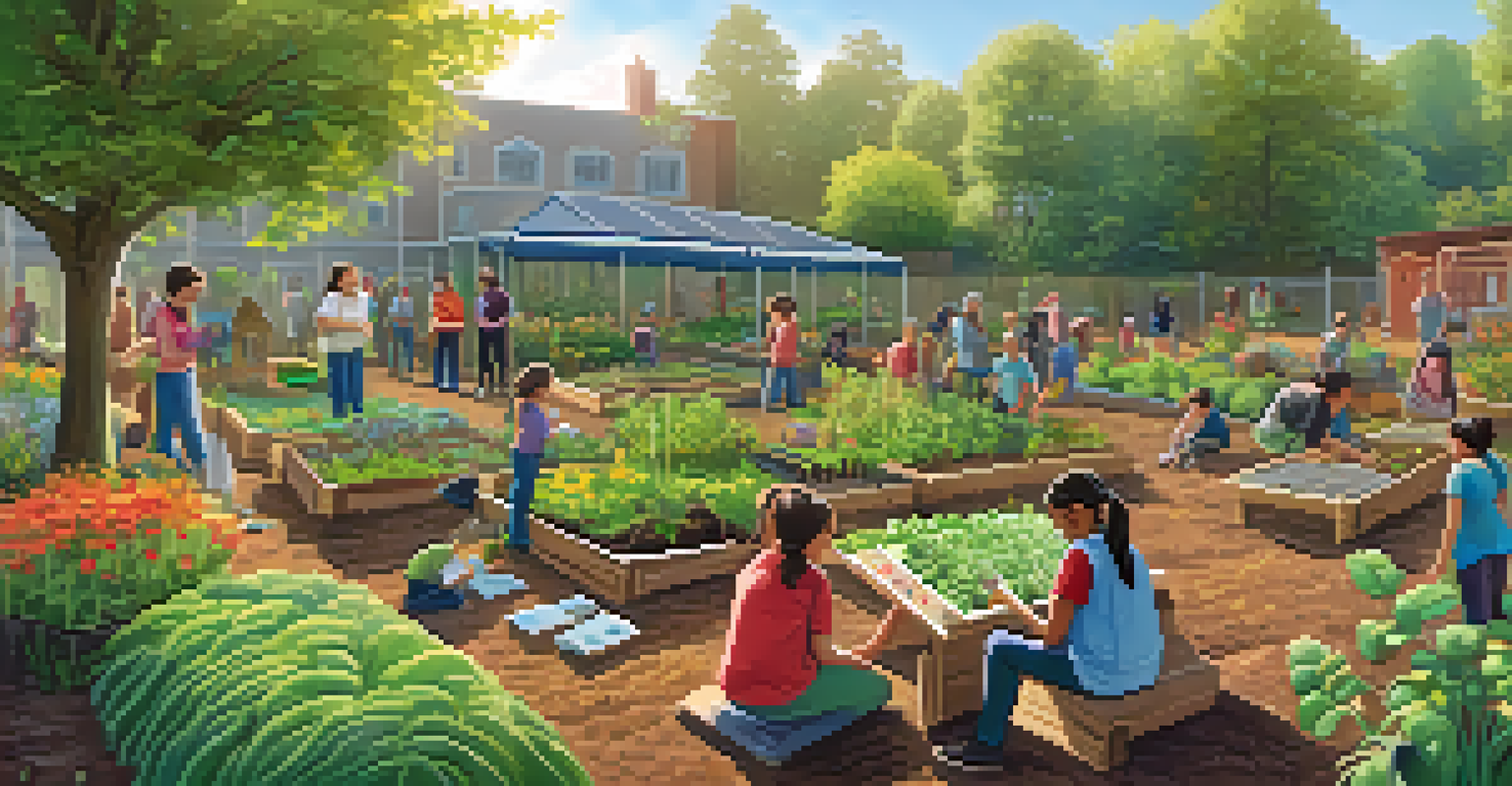Sustainability Practices in Pasadena's Community Gardens

The Rise of Community Gardens in Pasadena
Pasadena has seen a remarkable growth in community gardens over the past decade, providing residents with a space to cultivate their love for gardening. These gardens not only beautify the neighborhoods but also create a sense of community among local gardeners. As people come together to share resources and knowledge, they also foster connections that enhance community spirit.
The greatest threat to our planet is the belief that someone else will save it.
Community gardens serve as a hub for sustainable practices, teaching individuals how to grow their own food while minimizing their carbon footprint. With the emphasis on local food production, these gardens directly impact the reduction of transportation emissions associated with produce delivery. This grassroots movement exemplifies how small efforts can contribute to larger environmental goals.
In addition to promoting sustainability, these gardens often host workshops that educate participants on various techniques, such as composting and organic farming. By sharing these skills, they empower community members to adopt eco-friendly habits that extend beyond the garden. This knowledge transfer is a key component in building a more sustainable Pasadena.
Organic Gardening: A Sustainable Approach
Organic gardening is at the heart of many community gardens in Pasadena, emphasizing the use of natural methods for pest control and soil enrichment. By avoiding synthetic fertilizers and pesticides, gardeners maintain the health of the ecosystem and promote biodiversity. This method not only yields healthier produce but also nurtures a flourishing environment for beneficial insects and microorganisms.

Many community gardeners practice crop rotation and companion planting, which are effective strategies in organic gardening. Crop rotation helps prevent soil depletion and reduces the risk of pests and diseases, while companion planting encourages symbiotic relationships between different plant species. These techniques illustrate how sustainable practices can lead to healthier plants and increased yields.
Community Gardens Foster Connection
Pasadena's community gardens not only beautify neighborhoods but also strengthen community bonds through shared gardening experiences.
The commitment to organic gardening also extends to education efforts within the community. Workshops on composting, natural pest deterrents, and soil health are common in Pasadena's community gardens, empowering residents with the knowledge to grow sustainably. This collective learning not only enhances individual gardens but strengthens the community's overall environmental impact.
Water Conservation Techniques in Community Gardens
Water conservation is a critical aspect of sustainability in Pasadena's community gardens, particularly given California's history of drought. Many gardens implement techniques such as drip irrigation and rainwater harvesting to maximize efficiency and minimize waste. These methods not only conserve water but also ensure that plants receive the moisture they need without over-saturation.
We won't have a society if we destroy the environment.
Mulching is another effective strategy employed by gardeners to retain soil moisture and reduce evaporation. By covering the soil with organic materials, gardeners create a barrier that slows down water loss, leading to healthier plants and less frequent watering. This practice is beneficial not just for the gardens but also for the local water supply.
Moreover, community members often share knowledge about native plants that require less water, further enhancing the sustainability of their gardens. By planting drought-resistant species, they create beautiful landscapes that thrive on minimal water. This approach not only conserves resources but also showcases the beauty of California's native flora.
Composting for a Greener Future
Composting is a cornerstone of sustainable practices in Pasadena's community gardens, transforming organic waste into valuable nutrients for plants. By composting kitchen scraps and yard waste, gardeners reduce landfill contributions while enriching their soil. This closed-loop system exemplifies how waste can be repurposed to benefit the environment.
Many community gardens provide designated composting areas where members can learn about the process and contribute their organic waste. Workshops often demonstrate how to successfully compost at home, encouraging residents to adopt this eco-friendly practice. As more individuals engage in composting, the community moves closer to a zero-waste goal.
Sustainable Practices Enhance Growth
Organic gardening techniques, such as crop rotation and composting, empower residents to grow healthier plants while promoting environmental stewardship.
The benefits of composting extend beyond the gardens themselves; they contribute to healthier local ecosystems. By improving soil structure and fertility, composted materials promote vigorous plant growth and support biodiversity. This practice reinforces the idea that sustainability starts at home and flourishes within the community.
Biodiversity: The Heart of Community Gardens
Biodiversity plays a vital role in the sustainability of Pasadena's community gardens, emphasizing the importance of growing a variety of plants. Diverse plant species attract beneficial insects and pollinators, which are essential for maintaining a healthy ecosystem. By fostering biodiversity, these gardens become resilient against pests and diseases, reducing the need for chemical interventions.
Community gardens often showcase a mix of fruits, vegetables, herbs, and flowers, creating a vibrant tapestry of life. This variety not only supports local wildlife but also provides gardeners with a rich harvest throughout the growing season. By planting a range of species, gardeners can enjoy the benefits of seasonal diversity in their meals and promote ecological balance.
Furthermore, educational programs focus on the significance of biodiversity in gardening practices. Workshops on permaculture and polyculture highlight how these concepts can enhance sustainability and resilience. As gardeners embrace biodiversity, they contribute to a healthier planet while enjoying the beauty and bounty that comes with it.
Community Engagement and Education Initiatives
Engaging the community is essential for the success of Pasadena's community gardens, and many initiatives focus on education and participation. Regular events, such as garden tours and potlucks, foster a sense of belonging and encourage collaboration among residents. These gatherings not only celebrate the gardens but also build relationships that strengthen the community.
Educational programs often target schools and local organizations, providing hands-on experience in gardening and sustainability. Children and adults alike learn about the importance of local food systems, environmental stewardship, and healthy eating habits. By incorporating these lessons into school curricula and community events, Pasadena is nurturing a generation of environmentally conscious citizens.
Education Drives Community Engagement
Educational initiatives in Pasadena's gardens engage residents and foster a deeper understanding of sustainability and local food systems.
Additionally, partnerships with local organizations amplify the impact of these initiatives. Collaborations with non-profits and universities provide resources and expertise, enhancing the gardens' educational offerings. This collective effort ensures that sustainability practices thrive within Pasadena's community gardens and extend throughout the community.
The Future of Sustainability in Pasadena's Gardens
As Pasadena's community gardens continue to flourish, the future of sustainability looks promising. With increasing awareness about environmental issues, more residents are eager to participate in these initiatives. This growing interest not only supports local food production but also enhances community resilience in the face of climate change.
Innovative projects, such as vertical gardens and hydroponics, are emerging within the community garden movement, showcasing new ways to grow sustainably in limited spaces. These methods can maximize yield while minimizing resource use, providing exciting opportunities for urban gardeners. As technology and sustainability practices evolve, Pasadena's gardens are poised to lead the charge.

Ultimately, the commitment to sustainability in Pasadena's community gardens reflects a broader shift towards environmental responsibility. By fostering a culture of collaboration, education, and innovation, these gardens are paving the way for a greener future. The journey towards sustainability is ongoing, but the community is ready to embrace the challenge together.